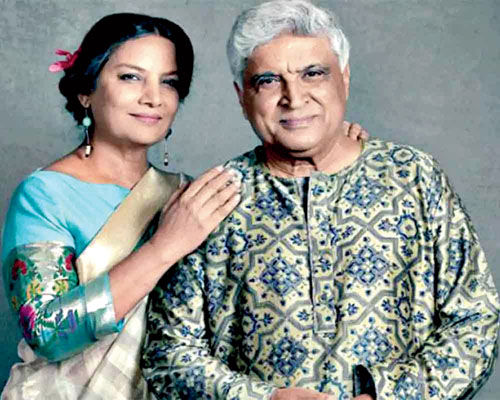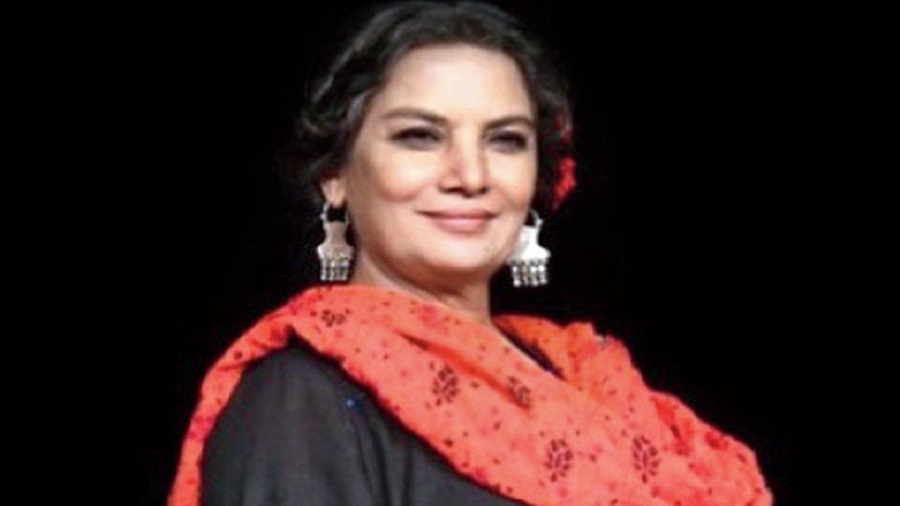Shabana Azmi is focusing on the ‘here and now’, spending time with family, catching up on her thoughts and striving to give back to society in these times of the pandemic. The veteran actor revealed all, in conversation with film-maker Sangeeta Datta, at a virtual closed-door session for Ehsaas Women, an initiative of the Prabha Khaitan Foundation last week. Excerpts...
Life has brought us to a point where the here and now has become important. So what is the ‘now’ all about for you?
I am in Khandala, in our home Sukoon, which was made with great love about eight years ago by Javed (Akhtar, husband). It’s a gorgeous house, but we’ve never had an opportunity to spend any time here at all. After the lockdown, we came here, and two things have happened. First, this is the first time I have spent this amount of time with Javed in the 36 years of our marriage! (Laughs) Second, as Javed says, it’s a very strange situation, because what the lockdown has done is made us into a joint family from a nuclear family. I have my aunt visiting, my brother Baba and his family are close by, my friend is just within walking distance... so what we have formed is a sort of community.
We were feeling a sort of suffocation in Mumbai... we are feeling much better here. The monsoons are on, it’s absolutely gorgeous and we are surrounded by trees. It’s very relaxing here. It’s quite surreal that in the middle of such a taxing time, we have sort of made a little island for ourselves, where only the ‘now’ matters.
But, of course, one is cognisant of the fact that this is only a bubble and the pandemic is a catastrophe of the kind that most, especially those born after the Partition, haven’t seen and hopefully will never see. There’s a lot of upheaval and the disparity between the haves and the have-nots has become even more evident now. It’s leading me to a kind of introspection and making me re-evaluate many things... like the difference between want and need. Life can actually be lived very simply and I have been wrestling with the idea that less is more. I think it’s a good time in my life to see that I can do with much less and that I need to give much more. All of us, of course, have come forward to help, but I feel that unless you give till it hurts, it doesn’t make a difference.

With husband Javed Akhtar Sourced by the Telegraph
Do you feel we will move towards being a more empathetic society?
We need to really dwell on the lessons this pandemic has taught us and not forget them as soon as things get back to normal. Instead of constantly saying, ‘Oh god, when will this end?’ we should tell ourselves, ‘I don’t know when this will end... let’s live in the now and stop worrying about when and how this will end’. In an almost spiritual way, it makes you aware of the here and now. We spend all our lives either dwelling on the past or imagining a future. We forget the joy of experiencing the now. And that I am doing in a way that I have never done before.
Javed saab has famously said that before this time came upon us, the two of you would only meet at airports or just in passing, given how busy you both are...
The funniest thing is that we have discovered how much we enjoy each other’s company! (Laughs) That’s a good thing after 36 years of marriage, right?!
You had a road accident earlier this year, but plunged into shooting in March. What were you working on just before the world went into lockdown?
I was actually in Budapest shooting for Halo (produced by Steven Spielberg) and then we were told that everything had to be put on hold for the pandemic. I came back to Bombay and immediately went into self-isolation, and everything’s been on a halt since then. I am doing a film with (chef-filmmaker) Vikas Khanna, some portions of that are left. I was supposed to start my series Moghuls with Nikkhil Advani, but that’s on hold. So, in terms of ‘how’ and ‘what’ and ‘when’, there is uncertainty. I am just going with the flow.
Shooting has resumed in some quarters. But I did read an interview of yours recently where you said that television actors above age 65 are not being allowed to come on set because of the susceptibility factor...
It’s quite bizarre. This is apparently a directive of the home ministry for the safety of the senior actors. This is very discriminatory. Why is this limited to only actors? Can anyone guarantee that from now on, anyone above age 65 will not attend political rallies? As long as the concerned person passes the health test and is willing to take responsibility — and it’s the responsibility of the producer too to ensure that all safety measures are in place — then there shouldn’t be an issue. Kanwaljit Singh is such a fine actor and such a fit person but he has been replaced (on the TV show Sandwich) by a 40-year-old guy who has to put grey in his hair and pretend to be 65 years old! We have appealed to the government and to Hema Malini ji, who is a member of CINTAA (Cine & TV Artistes Association), and we are waiting to hear from the home ministry. In Calcutta and Bangalore, actors above 65 are shooting... so why is Mumbai being singled out?
You had a rather unusual childhood that you spent in a commune. Tell us about it...
My father (Kaifi Azmi) only earned Rs 40 for all the work he did for the Communist Party. So my mother (Shaukat Azmi) had to go out and work as a radio announcer with Vividh Bharati and after that in theatre. We lived in Red Flag Hall, which was the commune of the Communist Party. Eight families lived there, in rooms of just about 200sq ft. There was one toilet and one bathroom for eight families. And yet, there was no acrimony. I don’t remember anyone ever fighting... it was really like an extended family. We had a lot of intellectuals living there, all coming together for the similar worldview they had in terms of social justice and gender empowerment.
There was no division of religion at all, but there was a celebration of India’s diverse culture. We always celebrated all festivals, and continue to do so. There was and is a deep respect for the composite culture that is India.
You had your first theatre experience strapped on to your mother’s back...
My mother would strap me on her back and take me to her rehearsals at Prithvi Theatre. When she would rehearse, I would be in the green room and much fuss would be made over me. And when my mother was working, my father would put me on his shoulders and take me to mazdoor-kisan meetings. I would sit on his shoulders and see a sea of red flags being waved. I thought that signified party time... I had no idea it was the Communist Party flag (laughs). On one hand, my mother would take me to theatre and my father to mushairas. My brother and I would invariably go to sleep on stage amid the big bolsters and would wake up to thunderous applause, which meant it was my father’s turn at the mic. We had luminaries like Faiz Ahmad Faiz and Josh Mahilabadi (both legendary poets) as house guests... it was that kind of a childhood.
